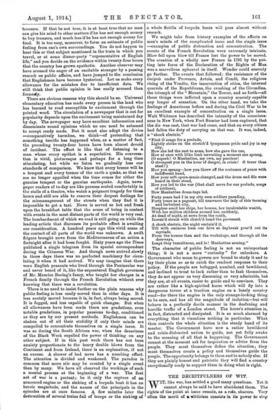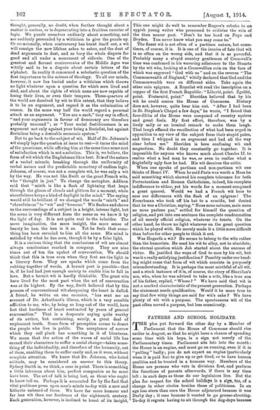THE DECEITFULNESS OF WIT.
WIT, like war, has settled a good many questions. Yet it cannot always be said to have elucidated them. The rights of the point at issue remain, as a rule, obscure. Very often the merit of a witticism consists in its power to stop
thought, generally, no doubt, when further thought about a matter is useless, or is degenerating into a fruitless exercise of logic. We puzzle ourselves endlessly about something, and are suddenly persuaded by a witticism to give the puzzle up. Or occasionally, when controversy has burnt itself out, a wit will consign the now lifeless ashes to ashes, and the dust of dead arguments to dust, and so bury the whole dispute for good and all under a monument of ridicule. One of the greatest and fiercest controversies of the Middle Ages was wittily said to be a dispute about certain letters of the alphabet. In reality it concerned a scholastic question of the first importance to the science of theology. To all our minds, however, it now lies buried under a witticism which throws no light whatever upon a question for which men lived and died, and about the rights of which none are now capable of losing their lives, or even their tempers. Three-quarters of the world are deceived by wit to this extent, that they believe it to be an argument, and regard it as the culmination of reason. In the same way half the world regard a personal attack as an argument. " You are a snob," they say in effect, " and your arguments in favour of democracy are therefore probably unsound" ; or " Your social fastidiousness is an argument not only against your being a Socialist, but against Socialism being a desirable economic system."
But to go back to the subject of wit. Half of Dr. Johnson's wit simply lays the question at issue to rest—it turns the mind of the questioner, w bile offering him at the same time some sort of satisfaction which is not a solution. This is, we believe, the form of wit which the Englishman likes best. It is of the nature of a verbal miracle, breaking through the uniformity of verbal nature and the predictable monotony of endless logic. Johnson, of course, was not a complete wit, he was only a wit by the way. He was not like Swift or the great French wits, who "thought in jest." To change the metaphor, Addison said that " mirth is like a flash of lightning that leaps through the gloom of clouds and glitters for a moment, while cheerfulness keeps a kind of daylight in the mind." The saying would still be brilliant if we changed the words "mirth" and "cheerfulness" to " wit " and "humour." Wit flashes and shows us the surroundings of a subject in a bright, intense light, but the scene is very different from the scene as we know it by the light of day. It is not quite real to the beholder. The more imagination, the more insight, the more sense of beauty he has, the less is it so. Yet he feels that some- thing has been revealed to him all the same. His mind is satisfied by what he has seen, though it be by a false light.
It is a curious thing that the conclusions of wit are almost always conclusions reached in company. They are nine times out of ten the upshot of conversation. We should think that this is true even when they first see the light in a literary form. They are sparks which come from the rubbing together of words. A hermit poet is possible—that is, if he had had just enough society to enable him to fall in love. But a hermit wit is hardly thinkable. The great wits have lived for the most part when the art of conversation was at its highest. By the way, Swift believed that by this process of conversational wit-sharpening the heart is dulled. A friend, he writes on one occasion, "has sent me an account of Dr. Arbuthnot's illness, which is a very sensible affliction to me, who, by being so long out of the world, have lost that hardness of heart contracted by years of general conversation." That is a desperate saying quite worthy of its author, but containing, surely, a great deal of unpleasant truth. Some form of perception seems to desert the people who lire in public. The acceptance of sorrow which they call pluck has something in it of bluntness. We mean that the action of the waves of social life has caused their characters to suffer a social change—taken some- thing of the individuality, and therefore of the humanity, out of them, enabling them to suffer easily and, as it were, without complete attention. We know that Dr. Johnson, who hated solitude, may be considered an answer to this theory. Sydney Smith is, we think, a case in point. There is something a little inhuman about him, perfect companion as he must Lave been. The art of talk is being lost, so those who ought to know tell us. Perhaps it is accounted for by the fact that vital problems press upon men's minds to-day with a new and hitherto unheard-of force. We have far more humour and far less wit than our forebears of the eighteenth century. Each generation, however, is inclined to boast of its insight. This one might do well to remember Rogers's rebuke to an uppish young writer who presumed to criticize the wits of the then nearer past. "Don't be too bard on Pope and Dryden. You never know what you may come to."
The finest wit is not often of a partisan nature, but some- times, of course, it is. It is one of the ironies of fate that wit is so often on the wrong side, and that it is so powerful. Probably many a stupid country gentleman of Cromwell's time was confirmed in his wavering adherence to the Stuarts by the wit who, looking at a Cromwellian coin on the face of which was engraved " God with us " and on the reverse " The Commonwealth of England," wittily declared that God and the Commonwealth were on different sides. Take again the other coin epigram. A Royalist wit read the inscription on a copper of the first French Republic: "Liberte, point. Egalite, point. Fraternite, point." Sheridan believed that by his wit he could coerce the House of Commons. History does not, however, quite bear him out. "After I had been in St. Stephen's Chapel a few days," he wrote, "I found that four-fifths of the House were composed of country squires and great fools. My first effort, therefore, was by a lively sally or an ironical remark to make them laugh. That laugh effaced the recollection of what had been urged in opposition to my view of the subject from their stupid pates, and then I whipped in an argument and had all the way clear before me." Sheridan is here confusing wit and magnetism. No doubt they constantly go together. It is impossible for anyone who knows much about Charles IL to realize what a bad man he was, or even to realize what a frightfully ugly face he had. His wit deceives the critic.
When one speaks of partisan and non-partisan wit one thinks of Henri IV. When he said Paris was worth a Mass he said something which showed his complete tolerance for both Protestantism and Roman Catholicism, indeed, his complete indifference to either, yet his words for a moment composed a great quarrel. Would we had a French wit here to ease our differences with the flash of an epigram ! The Frenchman who took off his bat to a crucifix, but denied that he was a Christian, saying, " Nous nous saluons, mais nous ne nous parlous pas," settled for himself the question of religion, and put into one sentence the complete condemnation of all merely official religion, whatever its tenets. On the other band, he threw no light whatever on the great question which he played with. He merely made it a little more difficult than before for other people to think it out.
Was Hogarth a wit? He seems to belong to the wits rather than the humorists. He used his wit to allay, not to elucidate, the eternal question which Job started about the success of virtue. He justified the ways of God to men by his wit, but was it a really satisfying justification ? Possibly under our head- ing might come that form of wit which consists in purposely misunderstanding. It is perhaps the most mirthful of all wit, and a stock instance of it is, of course, the story of Sheridan's son, who, when he was advised to take a wife, like a true son of his father, replied, " Whose " We have said that wit is not a marked characteristic of the present generation. Perhaps the statement needs qualification. Would it be more true to say that few witty things are said for wit's sake ? We have plenty of wit with a purpose. The spontaneous wit of the past often served a purpose, but less consciously.



































 Previous page
Previous page